Diego Luna and Hayden Christensen Fan Out: ‘Star Wars’ Secrets, Lightsaber Bruises and the Franchise Bringing ‘Freedom’ and ‘Financial Stability’
- Oops!Something went wrong.Please try again later.
- Oops!Something went wrong.Please try again later.
- Oops!Something went wrong.Please try again later.

Hayden Christensen and Diego Luna have never met, but as Christensen puts it, they’ve occupied the “same galaxy” for years. Christensen rocketed from teenage obscurity in Canada when George Lucas cast him as Anakin Skywalker for 2002’s “Star Wars: Episode II — Attack of the Clones” and 2005’s “Revenge of the Sith,” which chronicled the young Jedi’s transformation into the iconic villain Darth Vader. The Mexican-born Luna — who rose to prominence in Alfonso Cuarón’s 2001 coming-of-age masterpiece “Y tu mamá también” — joined “Star Wars” for 2016’s “Rogue One,” a prequel about the band of rebel spies, led by Luna’s Cassian Andor, that steal the plans for the Death Star.
Both men thought their “Star Wars” journeys ended with those films — in Luna’s case, because his character dies — but it turns out they were merely frozen in carbonite. Christensen, 42, returned last year as both Anakin and Vader in the Disney+ limited series “Obi-Wan Kenobi,” with his former co-star Ewan McGregor as the titular Jedi master 10 years after the events of “Revenge of the Sith.” Luna, 43, headlines Disney+’s “Andor,” a “Rogue One” prequel series from executive producer Tony Gilroy that radically reframes “Star Wars” storytelling from the perspective of everyday people struggling under the yoke of the Empire. Season 2 is filming in London; Luna, who is also an executive producer, flew into Los Angeles just for this conversation.
More from Variety
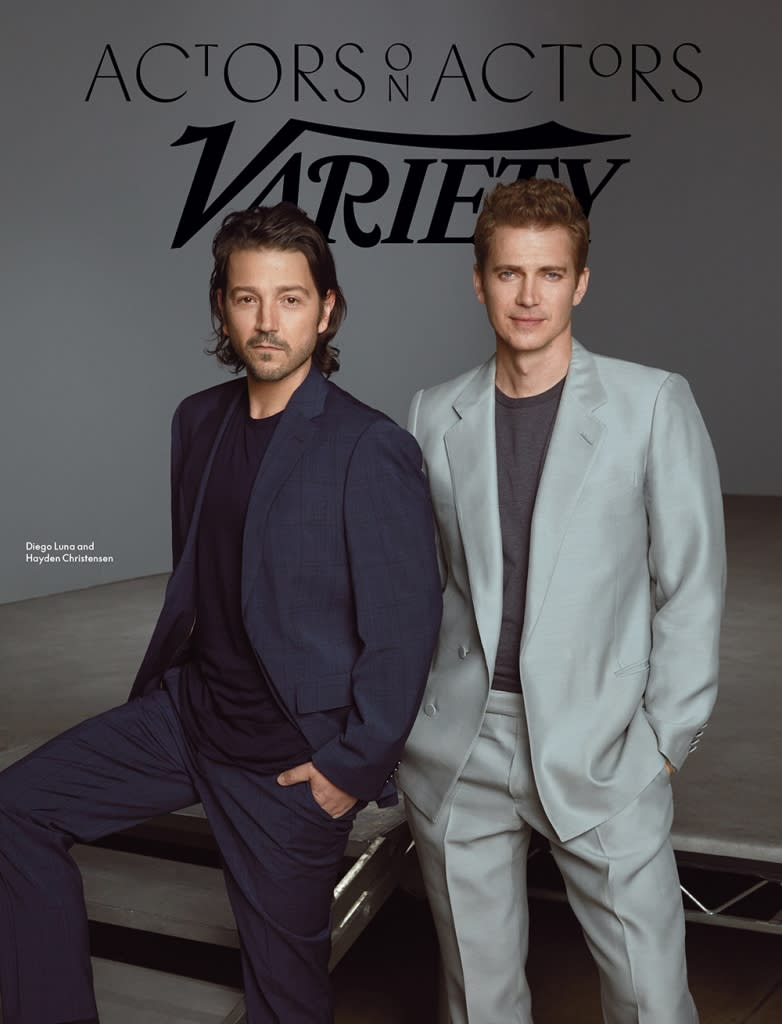
DIEGO LUNA: I do have a show where I do this, but it’s in Spanish.
HAYDEN CHRISTENSEN: My Spanish isn’t so good.
LUNA: Oh shit. Then I’ll try with my broken English. I’m going to start with something that for me has been present since the day I started working on “Rogue One.” Suddenly, acting became as personal as reconnecting with my childhood. You were around 20?
CHRISTENSEN: When I first started with “Star Wars”? Yeah, I was 19.
LUNA: How did that feel back then? Were you still attached to this universe?
CHRISTENSEN: Yeah, big time. I loved “Star Wars,” and when the audition came around, it was exciting, but it felt just unattainable. I remember meeting George Lucas for the first time and that was thrilling. And then auditioning with Natalie Portman. It was a very long process, but the entire time, I never really thought that it would ever go my way, so I was just enjoying it. Then when I got the phone call to play the part, it was a life-changing thing.
LUNA: But you started acting before, no?
CHRISTENSEN: Yeah, I’d started when I was young. I developed my passion for it studying theater in elementary school. And then I went to a performing arts high school and focused on dramatic studies.
LUNA: That must have been a shock to go from theater to [“Star Wars”]. And back then, your films were the most technologically advanced.
CHRISTENSEN: But there was a similarity there, too, because we were filming in front of blue screens and green screens. It demands a lot of your imagination, and you don’t necessarily have all of the real stimuli there to react to. So it wasn’t such a leap for me. And I didn’t have the experience either, so it wasn’t like I was used to working a certain way. That was just what I knew.
LUNA: I had this rule of doing a play every two years after “Y tu mamá también.”
CHRISTENSEN: That was the first film that I remember seeing you in. Such a great film.
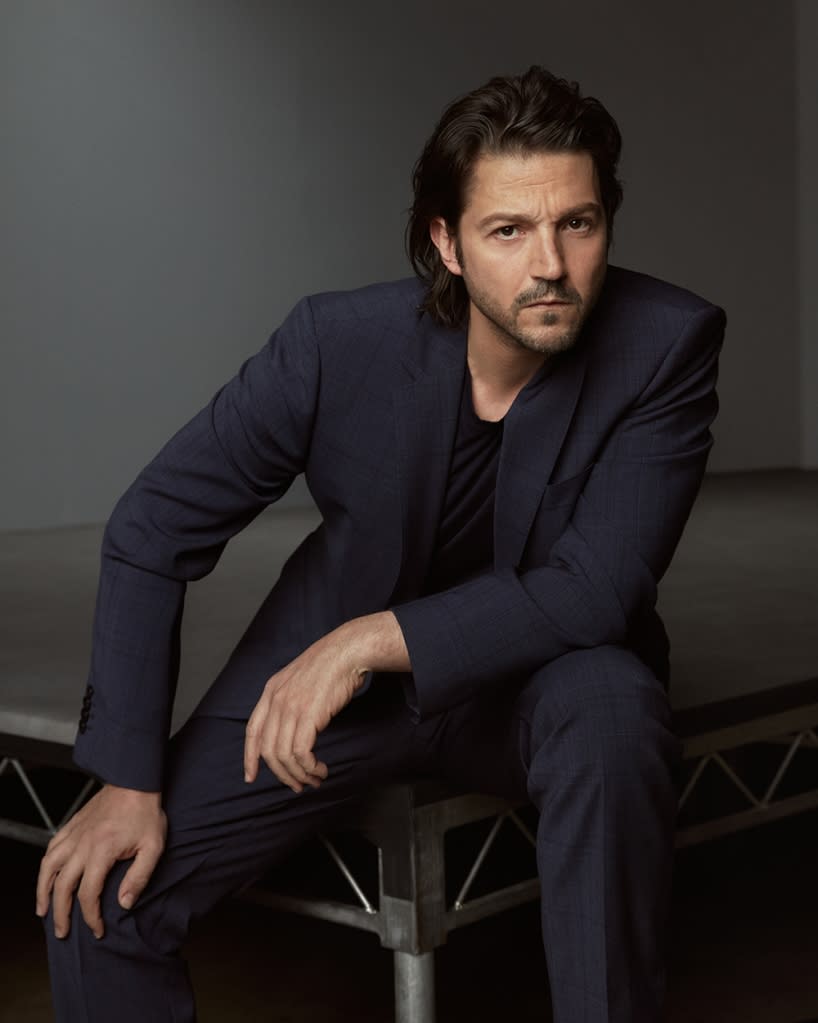
LUNA: I was 20. That’s why I was establishing those parallels. It’s like, for you at 20, “Star Wars” happened. For me, [“Rogue One”] connected me with something I didn’t know even existed or that I could be part of. Suddenly, my work had a chance to find audiences in countries that I didn’t speak the language of. All my first work, it happened all in Mexico. It was theater, films or TV that no one got to see.
CHRISTENSEN: I’d really love to hear about how you got into “Rogue One.” You were already a very established actor.
LUNA: It was the first time such secrecy happened around anything I was going to be part of. I was asked by my agent to meet someone for something that couldn’t be said on the phone. I went into a meeting in a restaurant that was completely empty. There was a guy sitting in the corner with a computer open, and this was Gareth [Edwards], the director. I sat down with him, and it was just us for four hours.
CHRISTENSEN: So you had no concept that it was “Star Wars” at all at this point?
LUNA: My agent said, “This might be ‘Star Wars.’” I guess she didn’t want me to get excited about anything. Gareth explained to me the whole film, and he said at the end, “I would really like you to play this role.” I said to him, “But I don’t see myself here. I love these films, but how do I fit here? No one has my accent. I’ve never thought this could be possible.” He basically said, “Since I saw ‘Y tu mamá también,’ I thought you could be great for a role like this. I want that kind of tone in the film. I want that realism, that feeling that it’s everyday life.” I never thought that a film like “Y tu mamá también” would get me the chance to be in the world of “Star Wars.”
CHRISTENSEN: That’s what I love about it. It’s a much darker and more grounded sort of take. I think it was very important for “Star Wars.” I love your performance. There’s so much subtlety to it and nuance to it, which you can’t always get in stories like these. How was that for you?
LUNA: Thank you. It was something that we reminded ourselves every day on “Rogue One.” And on “Andor,” we took even further, the idea of you have to forget this is “Star Wars.” Tony Gilroy was very specific, always. Every time you had to explain too long what you wanted to do, he would be like, “There’s no room for that. It has to be simple. It has to be easy. It has to be real.” It was a constant reminder every day. If it started to feel imposed or weird or from “a galaxy far, far away,” then we were doing the wrong thing.
CHRISTENSEN: I thought that my “Star Wars” days were behind me, and then I got a phone call inviting me to come back. I would imagine maybe you had a similar thing with when you finished “Rogue One.” Did you know were going to get to continue with it?
LUNA: It was a joke on set: “One day, we should tell how these people got here.” But we never took it seriously. We didn’t know if the film was going to be liked or if we were going to be the film no one went to see. We had to wait for the film to come out to understand that there was room for something like this.
CHRISTENSEN: It was one of my favorite “Star Wars” films.
LUNA: Oh, man!
CHRISTENSEN: And “Andor” is so successful, too. It’s a great origin story for the beginning of the rebellion and getting to see the arc of your character and how he starts off at this place where he doesn’t really want anything to do with any of this. He just wants to keep to himself. But his destiny is calling.
LUNA: I think it’s because you know what he’s capable of. So the interesting journey is how far can we start from that? How lost can he be? It’s a show about his flaws and that contradiction that makes us real. We’re not always the best version of ourselves. It was nice to find him in the worst version of Cassian possible.
When you decided to come back for the “Obi-Wan” series, what was behind that decision?
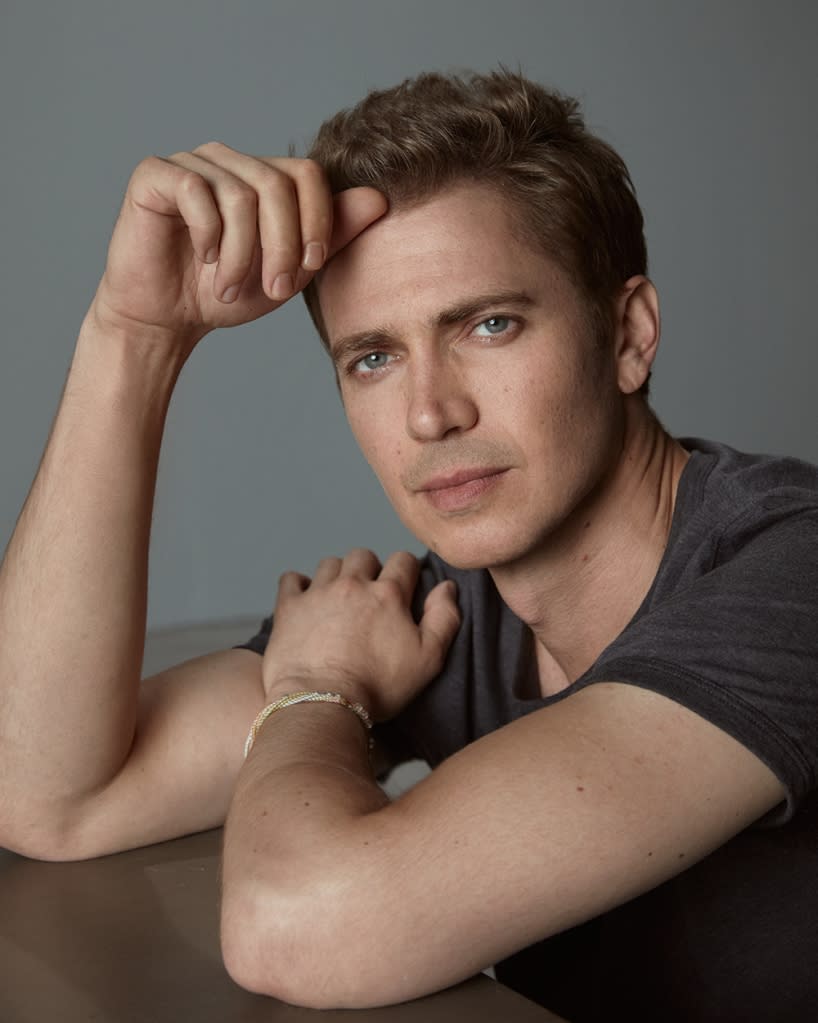
CHRISTENSEN: Just the nature of getting the invitation. “Star Wars” holds a very special place in my heart. I enjoyed getting to go back to being a fan again and just watching these stories like everyone else. But there was a part of me that missed it, too. So when I got the call, it was a very easy decision. And the fact that it was the “Obi-Wan” show with Ewan McGregor, who is a good friend of mine, and that I’d get to swing a lightsaber with him again, it was a thrilling invitation. The director, Deborah Chow, is so articulate about what “Star Wars” is. She understands these characters so well. So I just felt like I was in good hands with her, and I was excited to get to do more with the character.
LUNA: That’s so— I mean, it’s not just a character, man. It’s the character.
CHRISTENSEN: It’s a good character!
LUNA: If I have to think about the worst nightmares of my life, it really…
CHRISTENSEN: …involves Darth Vader? [Laughs]
LUNA: I remember waiting two, three months for my Darth Vader case when I was, like, eight, nine years old. You had to go to the toy store and say, “I want this” and order it. I used that until I was a teenager, until my friend said, “That’s not cool anymore. Can you just bring a backpack?”
CHRISTENSEN: Yeah, well, they’re good at the merchandising. The image of Darth Vader is very well known. I remember being a kid, before I had seen the films, having a connection to this character, just being very taken with the physical presence and the voice. I remember scaring my little sister just trying to imitate the Darth Vader voice, and it worked. So there’s something about the construct of that character that just is very effective.
LUNA: I think it’s more than just the look and the presence. It’s the story behind, the simplicity of that.
CHRISTENSEN: Yeah, for sure. George Lucas subverted our expectations and understanding of this character, when he went back to “Episode I” and introduced him as this very sweet young kid who just had a lot of promise and potential. He mapped out a very compelling character arc that was hopefully somewhat sympathetic. I think we understood what Anakin was going through, and why he was making some choices that perhaps weren’t the best, and the circumstances surrounding his life. So it was a very understandable fall to the dark side, but it humanized him and made him a real person and almost somewhat of a pathetic person in a lot of ways. And you feel for Darth Vader now in a different way, too. Because it’s this man trapped in this life that perhaps he didn’t really want.
LUNA: Yeah, I like that. I connect that with what Tony Gilroy did with “Andor,” this idea of having to tell a story backwards. We have an opportunity to make sure this character comes from a past that you would never imagine.
CHRISTENSEN: On “Andor,” you’re a producer as well. What’s that like?
LUNA: I would say a good 15, 20 years ago, I started to be very much aware of what was happening before and after [shooting] and very interested in being part of that. Sometimes acting, in a way, alienated you from the actual process of making film. Theater is the opposite. In theater, you were there from the first read until the moment where you’re packing the props and the costumes.
CHRISTENSEN: But as an actor you can get insulated in your character in a lot of ways.
LUNA: In film, yeah, and you arrive when most choices have been made. It’s nice to get involved from the beginning, from the moment where designs are just sketches, and your questions and comments can have an input.
CHRISTENSEN: How cool that you got to be a part of the process at such an early stage.
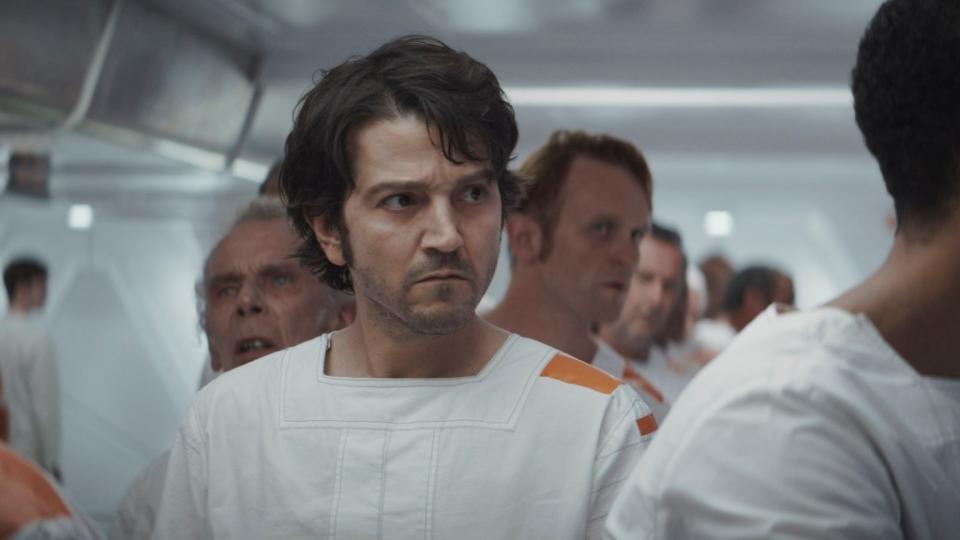
LUNA: So cool. This is 24 episodes. It’s going to be four-and-a-half years of our lives. So it’s the only way, because you have to own it. I took a flight last night to be here to talk to you, and I’ll take a flight right now to go back to work because I care about this show and because it feels mine. I want to defend what we do, and fight to make it better.
CHRISTENSEN: I would assume you’re that much more invested in the work you’re doing as an actor, too, because you’ve been a part of all of those decisions along the way.
LUNA: Mmmhmm. We have hundreds of speaking parts, so many actors come in and out of our show. It’s good that you can make them feel safe and give them the information they need. It’s a great feeling to know what you’re part of. In cinema, many times it can be the other way around, you can arrive at the premiere and realize you were part of a film you didn’t know you were doing.
I do think that, for me, “Star Wars” brought freedom in many ways. But what did it bring to you?
CHRISTENSEN: I mean, it would be easier to count the ways that it didn’t affect my life. It gave me an acting career. It gave me financial stability, which as a creative person is something that you can struggle with. After I finished “Star Wars,” there was still a desire for me to go back to smaller, more independent filmmaking and just try to cut my teeth as an actor. Because I was still learning a lot. I just tried to not think about navigating a career as much as I was just trying to do work that appealed to me, and play characters that I thought would challenge me, and help me grow as an actor. That was a great freedom.
But what “Star Wars” has really given me is a connection to all the people that love these stories. That’s such a special thing that you can’t fully appreciate unless you’re a part of something like that. I mean, I meet people now and it makes me feel a little bit old, but they’ll say to me, “Anakin was my hero when I was a kid, and now my kid loves Anakin.” It’s this generational thing that gets passed down — and that’s really special.
How has “Star Wars” changed your life?
LUNA: I would say that has been a shock, in a good way — the love around this project and this universe. The expectation and the awareness about your show before you even finished. I’ve spent whole life trying to get people’s attention to say, “Hey, look, we have a film here, you might like it!” Here, it’s the opposite. It’s not just that they’re expecting the film or the show to come out, but they also want to love it. They want to feel part of what you are doing, that connection you don’t find anywhere else.
You also have to understand why it’s happening. You are part of something else. If you’re expecting that to happen when you put on this very strange play — and you suddenly go like, “Oh shit, no one came tonight”…
CHRISTENSEN: That’s really astute. To be aware that you’re a part of something that is bigger than you, I think is a healthy thing.
LUNA: It is. And enjoy the ride with them. Before I did “Rogue One,” I thought, My life is going to change. My life is the same, but I feel that it changed me. Now I’m different. I still do theater. I still do the films I can in my country. But now I see it from a different perspective. I grew up thinking that it was impossible to do something really good, something you feel really proud of, something that it has an artistic integrity — and be popular at the same time. I grew up in the Mexican theater, where fame and popularity happens when you sell out. After doing “Andor” and “Rogue One” and being part of the “Star Wars” family, I realized, no. You can have integrity, you can do things you care about, that I would like to see as audience — and those things can be popular and huge at the same time.
CHRISTENSEN: It’s a unique thing, though, to be able to have your cake and eat it too. So we should be appreciative that we get to do that sort of thing.
LUNA: I like that expression. “Have your cake…?”
CHRISTENSEN: “…And eat it too.” I never really fully understood it, because I was like, if you’re going to have cake, why wouldn’t you be able to eat it?
So after you finished “Rogue One,” did you get to keep any souvenirs? Usually everything goes into lockdown and then they send it to a museum somewhere.
LUNA: I got the jacket of the character. I really worked for that. I made jokes about it since day one. I was like, “I just got this job because this jacket fits me. Clearly, it’s all about the jacket.”
CHRISTENSEN: It’s a good jacket.
LUNA: And then the jacket had to be worn in Jordan at 45 degrees Celsius. I mean, it was impossible. I was sweating. But I’m sure you got a lot of the sweating also with the outfit.
CHRISTENSEN: With the Darth Vader outfit? Yeah, it’s a hot costume.
LUNA: You have a daughter. Are you ever going to…
CHRISTENSEN: Have her see me in the [Darth Vader outfit]? Well, hasn’t happened yet. She’s eight now. I don’t know if I can wait much longer. I know I’ve been dragging my feet a little bit. She knows that I’m in “Star Wars” and that I played this character, but she’s never seen it yet. I’m getting to that. I’m trying to figure out the best sort of point of entry.
LUNA: It doesn’t sound easy, man. I would talk to psychologists and get some advice. It’s not going to be simple!
CHRISTENSEN: I know, I know! There are some disturbing scenes I’m reluctant for her to see at this age. But it was really nice getting to do the “Obi-Wan” show and actually bring her to set. Not when I was in the Darth Vader outfit, but we did the flashback sequence and I got to play Anakin. She got to see me swing a lightsaber with Ewan. She was very concerned for my wellbeing. She was afraid that one of us were going to get hurt.
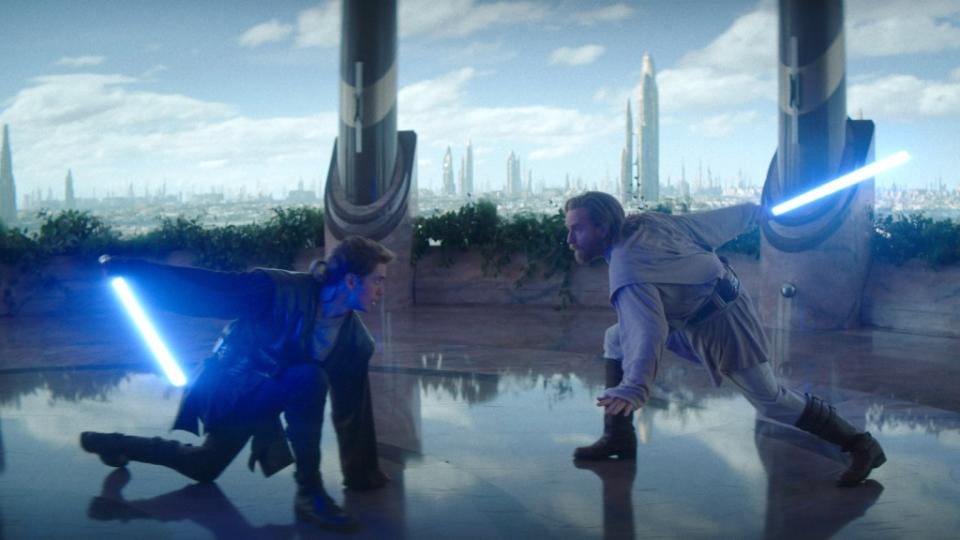
LUNA: How do you guys do that?
CHRISTENSEN: The lightsabers stuff? It’s a lot of training. You learn it kind of like a choreographed dance and where your feet are going to go.
LUNA: But do you actually have a stick that becomes a lightsaber?
CHRISTENSEN: Oh yeah. Once we know the choreography, then we’re having a proper go at each other. Back when we were doing the prequels, the lightsabers were made of some type of metal alloy and after each take, they would be all warped and bent.
LUNA: You’re going for it.
CHRISTENSEN: Yeah, we’re hitting pretty hard. And you missed every now and then, too, and you’d get a hit on the knuckles or something. That always left a mark. But, I mean, getting to swing a lightsaber is pretty awesome. I got to keep a couple of them. One from the prequels, and then I got to keep two lightsabers from the “Obi-Wan” show — one Darth Vader, and one Anakin, because they’re a little bit different.
LUNA: Wow, that’s cool! When we were shooting the first week or two of “Rogue One,” they gave us an amazing gift, these designs of the helmets of storm troopers. I’m not going to say who, but an hour later, that was in all the social media. That was the last gift we got in the show.
CHRISTENSEN: They were like, never again.
LUNA: Yeah, that was it. The secrecy. How do you live with that?
CHRISTENSEN: There are a lot of secrets in “Star Wars.” It’s tough.
LUNA: And everyone wants to know them. You might have tons of secrets that are about your past that no one wants to hear about. You can be in a conversation where someone is just there to get you to say something you’re not supposed to say.
CHRISTENSEN: It’s tough for me because I like to share things. But I was always very tightlipped about everything. Of course, when I first got the phone call that I was getting the part, they were like, “You can’t tell anybody” — and I got on the phone right away and I told my mom, I told my best friend. But when it comes to story points and stuff that’s going on in the actual stories, I don’t want to be the one who gives it away. You want it to be that fresh experience for the audience.
LUNA: That’s another thing I really loved about being so rigorous about the secrecy. I grew up going to the cinema and knowing the title of the film and probably a name or two and that was it. Today, you have an opinion before you have seen the show, before the film comes out. You already know the music, how it looks, what happened on set and what others like about it, which is it’s quite sad. It takes a little bit magic away.
CHRISTENSEN: Yeah. I mean, they do a really good job of keeping the important [“Star Wars”] stuff secret. It’s also fun to be in on the secret, too.
LUNA: It connects with the way I watched TV in the ’90s. This idea of something coming out every week and having to wait. It gives you a week to reflect.
CHRISTENSEN: As soon as I finished “Andor,” I had to put on “Rogue One” again and get back into that. But man, I just wanted to say congrats on everything that you’ve done in “Star Wars,” and in your career in general. I think Andor is such an exciting character, and what you’ve brought to it is, I think, really special. It’s just really nice to get to be here with you and chat about it.
LUNA: It’s the other way around. And not just the films, but “Obi-Wan.” It was so reassuring to see your show work so well. It’s nice to be part of this family, and this crazy universe that connects three or four generations now.
CHRISTENSEN: It is a family, and I think one that stays with you for the rest of your life.
LUNA: You are part of a universe that somehow got me to do what I do. The weight and the richness of those films shaped me as a kid and as a teenager — and then as a young adult when yours came out. And now that I am part of this, I understand how much that story meant for me. It’s nice to have the opportunity to say it, because there are so many films that I love that I would never be in front of anyone that was part of them and say thank you. So thank you for that.
CHRISTENSEN: That’s so kind.
LUNA: When you said we are part of now of a family, now I know you’re in Toronto, I’m going to look for you. I’m going to be looking for my cousin. “Where’s my cousin?”
CHRISTENSEN: Man, the feeling’s so mutual. I’m such a fan of the work that you’ve done and the work that you’re continuing to do. You’re still filming the second season of “Andor,” and just as a fan, I’m so excited for it and can’t wait to see what’s next. •
Set Design: Lucy Holt; Production: Alexey Galetskiy/AGPNYC
Best of Variety
'House of the Dragon': Every Character and What You Need to Know About the 'Game of Thrones' Prequel
25 Groundbreaking Female Directors: From Alice Guy to Chloé Zhao
Sign up for Variety’s Newsletter. For the latest news, follow us on Facebook, Twitter, and Instagram.

